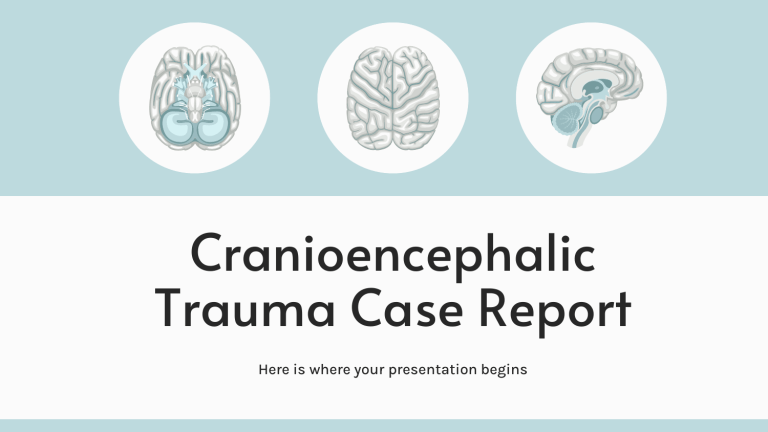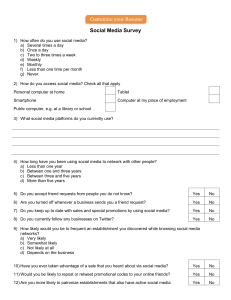
Cranioencephalic Trauma Case Report Here is where your presentation begins Contents of this template You can delete this slide when you’re done editing the presentation Fonts To view this template correctly in PowerPoint, download and install the fonts we used Used and alternative resources An assortment of graphic resources that are suitable for use in this presentation Thanks slide You must keep it so that proper credits for our design are given Colors All the colors used in this presentation Icons and infographic resources These can be used in the template, and their size and color can be edited Editable presentation theme You can edit the master slides easily. For more info, click here For more info: SLIDESGO | BLOG | FAQs You can visit our sister projects: FREEPIK | FLATICON | STORYSET | WEPIK | VIDEVO Table of contents 01 02 03 Abstract Introduction Case presentation 04 05 06 Discussion Conclusion Roadmap 01 Abstract Abstract In the abstract of your case report, you should provide a concise summary of the key aspects of the case. This includes: ● ● ● Briefly describing the patient's condition and relevant clinical findings Highlighting any unique or rare features of the case Mentioning the main interventions or treatments employed and their respective outcomes Introduction Background Importance Provide a brief overview of the condition or disease being discussed in the case. Include pertinent information about its prevalence, clinical manifestations and any relevant previous studies or literature Highlight the significance and educational value of the case. Emphasize the uniqueness, rarity, or complexity of the presented case, and explain how it contributes to the existing knowledge or clinical practice Case presentation Patient profile Clinical findings Diagnostic workup Include essential demographic information such as age, gender, and medical history. Describe the patient's chief complaint and the timeline of symptoms leading to the diagnosis Present an overview of the patient's physical examination findings, laboratory test results and any imaging or diagnostic procedures. Highlight key abnormalities that aid in the diagnosis Outline the diagnostic process, including the reasoning behind the chosen investigations and tests. Discuss the results, their interpretation and their contribution to reaching the final diagnosis Discussion Differential diagnosis Treatment Explore potential diagnoses based on the patient's presentation and relevant findings. Discuss distinguishing features for each and reasons for inclusion/exclusion Present the confirmed diagnosis and explain diagnostic criteria. Outline the chosen treatment approach and rationale behind it Clinical course Lesson learned Describe the patient's progression, treatment response and any significant events or complications. Summarize the final outcome Discuss the case's educational value, highlighting unique aspects. Share insights gained, including diagnostic challenges, treatment considerations or disease mechanisms Conclusion Challenge Success Lessons Address any diagnostic challenges, emphasizing the importance of thorough investigation and clinical reasoning Highlight successful outcomes achieved through the chosen treatment approach, showcasing effectiveness Summarize valuable lessons learned, providing insights to guide future clinical decision-making and enhance care Significance Research Summary Emphasize the case's educational value, impact on medical knowledge, professional development, and learning Identify areas for future investigation that have emerged from the case, stimulating advancements End with a concise concluding statement, summarizing the overall significance of the case Frontal lobe Occipital lobe 50,000 Patients on the study 20,000 Received placebo treatment 5,000 Pituitary gland Cerebellum Had secondary effects Cerebellum Frontal lobe Brain stem Cerebellum 95% Use percentages in your case report to quantify and communicate the frequency or proportion of important findings or outcomes A picture is worth a thousand words Using an image in your case report enhances visual representation and provides a concise and impactful way to present key findings or illustrate important aspects of the case This is a graph Understanding the numbers Incorporating a graph in your case report offers several advantages. It allows for the clear visualization and concise representation of data trends, comparisons, or correlations. By presenting information in a visual format, graphs enable readers to quickly grasp and interpret complex findings Follow the link in the graph to modify its data and then paste the new one here. For more info, click here This is a table Age Gender M. history Symptoms Diagnosis Patient 1 45 Male Hypertension Symptom Diagnosis 1 Patient 2 32 Female Asthma Symptom Diagnosis 2 Patient 3 60 Male Diabetes Symptom Diagnosis 3 Patient 4 50 Female None Symptom Diagnosis 4 Patient 5 28 Male None Symptom Diagnosis 5 Patient 6 70 Female Osteoarthritis Symptom Diagnosis 6 Milestones reached 01 02 03 04 Initial presentation with chief complaint Diagnostic evaluation and investigations Confirmation of the diagnosis Initiation of appropriate treatment 05 06 07 08 Monitoring response to treatment Resolution of presenting symptoms Follow-up assessment for outcomes Case discussion and lessons learned Case presentation: medical history About the patient Patient’s age 42 years old Gender Female Medical conditions Chest pain, shortness of breath Previous treatments None reported Introduction She has been experiencing these symptoms for the past 2 days, with the pain increasing in intensity and frequency Key findings ● Summarize the most important or relevant aspects of the patient's medical history ● Use bullet points to present the key findings in a clear and organized manner Conclusions 01 In this section, summarize the key findings from the medical history 02 Provide an overview of the implications for the current diagnosis and treatment plan Discussion Introduction: ● ● Briefly summarize the main findings and results of the case report Mention the purpose of the discussion and what will be covered Main discussion: ● ● ● Present different perspectives and opinions on the findings, based on the literature and other relevant sources Use bullet points to highlight key arguments and counterarguments Address any limitations or weaknesses of the study and suggest potential solutions or areas for further research Conclusions: ● ● Summarize the key points of the discussion and their implications for clinical practice or future research Offer any final recommendations or take-home messages for the audience Outcomes and recommendations Start 01 02 03 Outcome Outcome Outcome A. Write your recommendation B. Write your recommendation C. Write your recommendation D. Write your recommendation A. Write your recommendation B. Write your recommendation C. Write your recommendation D. Write your recommendation A. Write your recommendation B. Write your recommendation C. Write your recommendation D. Write your recommendation Photo showcase You can replace the images on the screen with your own work. Just right-click on any of them and select “Replace image” Frontal lobe Motor function area Wernicke’s area Occipital lobe Thanks Do you have any questions? [email protected] +91 620 421 838 yourwebsite.com CREDITS: This presentation template was created by Slidesgo, and includes icons by Flaticon and infographics & images by Freepik Please keep this slide for attribution Alternative resources Here’s an assortment of alternative resources whose style fits that of this template: Illustrations ● ● ● Free vector human brain poster illustrated silhouette of head profile with text description of glowing brain areas Realistic human brain infographic with colorful options Free vector flat icon of human brain side view on white background vector illustration Resources Did you like the resources used in this template? Get them on these websites: Photos ● ● ● ● ● ● ● Doctor looking over ct scan Cancer patient at hospital medium shot Doctor looking over ct scan Young and depressed adult at home Medium shot patient ready to get ct scan Doctor looking over ct scan High angle ct scan machine room Illustrations ● ● ● Brain anatomy set of isolated profile view images of brain with text captions on blank background vector illustration Free vector human brain poster illustrated silhouette of head profile with text description of glowing brain areas Free vector flat icon of human brain side view on white background vector illustration Instructions for use If you have a free account, in order to use this template, you must credit Slidesgo by keeping the Thanks slide. Please refer to the next slide to read the instructions for premium users. As a Free user, you are allowed to: ● ● Modify this template. Use it for both personal and commercial projects. You are not allowed to: ● Sublicense, sell or rent any of Slidesgo Content (or a modified version of Slidesgo Content). ● Distribute Slidesgo Content unless it has been expressly authorized by Slidesgo. ● Include Slidesgo Content in an online or offline database or file. ● Offer Slidesgo templates (or modified versions of Slidesgo templates) for download. ● Acquire the copyright of Slidesgo Content. For more information about editing slides, please read our FAQs or visit our blog: https://slidesgo.com/faqs and https://slidesgo.com/slidesgo-school Instructions for use (premium users) As a Premium user, you can use this template without attributing Slidesgo or keeping the "Thanks" slide. You are allowed to: ● Modify this template. ● Use it for both personal and commercial purposes. ● Hide or delete the “Thanks” slide and the mention to Slidesgo in the credits. ● Share this template in an editable format with people who are not part of your team. You are not allowed to: ● Sublicense, sell or rent this Slidesgo Template (or a modified version of this Slidesgo Template). ● Distribute this Slidesgo Template (or a modified version of this Slidesgo Template) or include it in a database or in any other product or service that offers downloadable images, icons or presentations that may be subject to distribution or resale. ● Use any of the elements that are part of this Slidesgo Template in an isolated and separated way from this Template. ● Register any of the elements that are part of this template as a trademark or logo, or register it as a work in an intellectual property registry or similar. For more information about editing slides, please read our FAQs or visit our blog: https://slidesgo.com/faqs and https://slidesgo.com/slidesgo-school Fonts & colors used This presentation has been made using the following fonts: Alata (https://fonts.google.com/specimen/Alata) Karla (https://fonts.google.com/specimen/Karla) #272727 #fbfbfb #b4b9b5 #d1d3d0 #e5e7e4 #d5f1f4 #bddade #99babf #759b9e #ffffff Storyset Create your Story with our illustrated concepts. Choose the style you like the most, edit its colors, pick the background and layers you want to show and bring them to life with the animator panel! It will boost your presentation. Check out how it works. Pana Amico Bro Rafiki Cuate Use our editable graphic resources... You can easily resize these resources without losing quality. To change the color, just ungroup the resource and click on the object you want to change. Then, click on the paint bucket and select the color you want. Group the resource again when you’re done. You can also look for more infographics on Slidesgo. JANUARY FEBRUARY MARCH APRIL MAY JUNE PHASE 1 Task 1 Task 2 PHASE 2 Task 1 Task 2 JANUARY PHASE 1 Task 1 Task 2 FEBRUARY MARCH APRIL ...and our sets of editable icons You can resize these icons without losing quality. You can change the stroke and fill color; just select the icon and click on the paint bucket/pen. In Google Slides, you can also use Flaticon’s extension, allowing you to customize and add even more icons. Educational Icons Medical Icons Business Icons Teamwork Icons Help & Support Icons Avatar Icons Creative Process Icons Performing Arts Icons Nature Icons SEO & Marketing Icons


